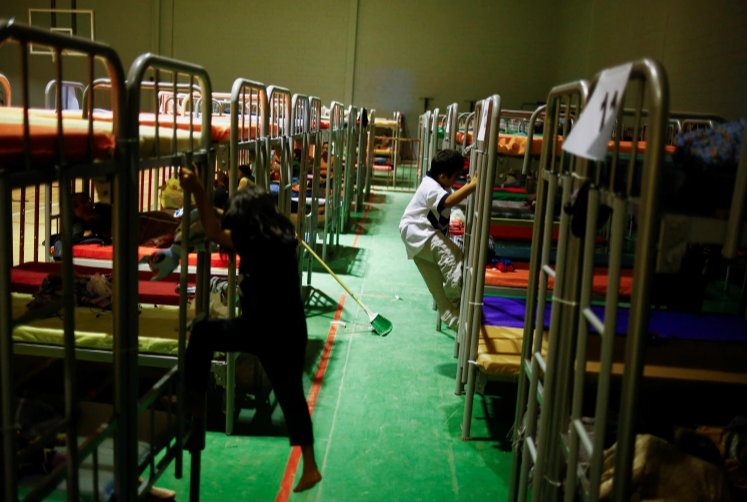
Central American children play after they were apprehended
United Nations, April 20 (RHC)-- Mexico has seen a nine-fold increase in the number of migrant children arriving since the beginning of the year, the United Nation’s child rights agency said, warning that many children are being held in overcrowded shelters near the country’s border with the United States.
In a statement on Monday, UNICEF said the number of children increased from 380 to almost 3,500 since the start of 2021. Half of the children, who hail primarily from Honduras, Guatemala, El Salvador and Mexico, have travelled without their parents – “one of the highest proportions ever recorded in Mexico”, the group said.
Children also made up almost 30 percent of migrants staying in some Mexican shelters. “I was heartbroken to see the suffering of so many young children, including babies, at the Mexican border with the US,” Jean Gough, UNICEF’s regional director for Latin America and the Caribbean, said in the statement.
“Most of the shelter facilities I visited in Mexico are already overcrowded and cannot accommodate the increasing number of children and families migrating northward. We are deeply concerned that living conditions for migrant children and mothers in Mexico could soon deteriorate further.”
In recent months, thousands of migrants and asylum seekers have travelled north from Central America – particularly the “Northern Triangle” countries of El Salvador, Honduras and Guatemala – and southern Mexico in hopes of entering the United States.
U.S. President Joe Biden has promised to reverse some of his predecessor Donald Trump’s most hardline immigration policies, and his administration has allowed unaccompanied minors who arrive at the US-Mexico border to enter the country.
Thousands of children remain in U.S. government custody as the Biden administration works to boost capacity to process the minors and release them to vetted sponsors in the country. U.S. border officials apprehended more than 172,000 migrants at the border in March alone, including nearly 19,000 unaccompanied children, according to US Customs and Border Protection (CBP) figures.
But the vast majority of migrants who seek entry into the US are turned away, in part due to a Trump-era order that effectively sealed the border to most migrants due to the COVID-19 pandemic.
Last week, Save the Children also warned that the number of unaccompanied children along the US-Mexico border is growing, and their journey “is becoming more dangerous as they are arriving in Mexico through unsafe routes to avoid immigration controls.”
“The situation is becoming critical,” Jorge Vidal Arnaud, director of Save the Children’s programmes in Mexico, said in a statement on April 16. “The shelters set up by the government or civil society in different parts of the country are filling up and risk becoming overcrowded. Some lack food or clean water, and some don’t have measures to prevent the spread of COVID-19,” he said.
Father Pat Murphy, director of Casa del Migrante in Tijuana, Mexico, told Al Jazeera in an interview last month that the shelter was home to about 60 people – mostly families from Central America – who want to apply for asylum in the US. “A lot of people are coming here with the idea that asylum is already open, and of course, it’s not open and it leads to a lot of confusion,” Murphy said.
He said human smugglers have exploited the confusion and the Biden administration’s decision to allow unaccompanied minors into the country, to get families to pay them thousands of dollars for their services. A recent CBP video showed smugglers dropping two young children over the wall at the US-Mexico border. “Unless you fix things in Central America, people will just keep coming because they’re desperate,” Murphy said.
Central American migrants have said recent devastating hurricanes, as well as longstanding economic hardships, unemployment, corruption and systemic violence, are some of the factors pushing them to leave their countries.

